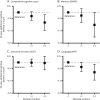Systemic inflammation during midlife and cognitive change over 20 years: The ARIC Study
- PMID: 30760633
- PMCID: PMC6511107
- DOI: 10.1212/WNL.0000000000007094
Systemic inflammation during midlife and cognitive change over 20 years: The ARIC Study
Abstract
Objective: To examine the association between systemic inflammation measured during midlife and 20-year cognitive decline.
Methods: Within the Atherosclerosis Risk in Communities cohort study, inflammatory biomarkers were measured during middle adulthood. We created an inflammation composite score using 4 blood biomarkers measured at visit 1 (fibrinogen, white blood cell count, von Willebrand factor, and factor VIII); we measured C-reactive protein (CRP) at visit 2. Cognition was assessed over 3 visits spanning 20 years using measures of memory, executive function, and language.
Results: A total of 12,336 participants (baseline age 56.8 [5.7], 21% black, 56% women) were included. After adjusting for demographic variables, vascular risk factors, and comorbidities, each standard deviation (SD) increase in midlife inflammation composite score was associated with an additional 20-year decline of -0.035 SD (95% confidence interval: -0.062 to -0.007) on the cognitive composite score. We found a similar association between each SD increase in midlife CRP level and additional 20-year cognitive decline (-0.038 SD, 95% confidence interval: -0.057 to -0.019). Participants with a midlife inflammation composite score in the top quartile had a 7.8% steeper cognitive decline, compared to participants in the lowest quartile; CRP in the top quartile was associated with an 11.6% steeper cognitive decline. In cognitive domain-specific analyses, elevated midlife inflammatory markers were most consistently associated with declines in memory. Results were similar after adjusting for attrition using inverse probability weighting.
Conclusions: Our findings highlight what may be an early pathogenic role for systemic inflammation as a driver of cognitive decline in the decades leading up to older adulthood.
© 2019 American Academy of Neurology.
Figures


References
-
- Yaffe K, Kanaya A, Lindquist K, et al. The metabolic syndrome, inflammation, and risk of cognitive decline. JAMA 2004;292:2237–2242. - PubMed
-
- Bialystok E, Craik FIM. Lifespan Cognition: Mechanisms of Change. Oxford, UK: Oxford University Press; 2012.
Publication types
MeSH terms
Substances
Grants and funding
- U01 HL096812/HL/NHLBI NIH HHS/United States
- T32 AG027668/AG/NIA NIH HHS/United States
- U01 HL096917/HL/NHLBI NIH HHS/United States
- U01 HL096902/HL/NHLBI NIH HHS/United States
- HHSN268201700002C/HL/NHLBI NIH HHS/United States
- HHSN268201700001I/HL/NHLBI NIH HHS/United States
- K24 DK106414/DK/NIDDK NIH HHS/United States
- U01 HL096814/HL/NHLBI NIH HHS/United States
- R01 HL070825/HL/NHLBI NIH HHS/United States
- U01 HL096899/HL/NHLBI NIH HHS/United States
- HHSN268201700003I/HL/NHLBI NIH HHS/United States
- R01 DK089174/DK/NIDDK NIH HHS/United States
- K01 AG050699/AG/NIA NIH HHS/United States
- HHSN268201700005C/HL/NHLBI NIH HHS/United States
- HHSN268201700001C/HL/NHLBI NIH HHS/United States
- HHSN268201700003C/HL/NHLBI NIH HHS/United States
- K24 AG052573/AG/NIA NIH HHS/United States
- HHSN268201700002I/HL/NHLBI NIH HHS/United States
- HHSN268201700005I/HL/NHLBI NIH HHS/United States
LinkOut - more resources
Full Text Sources
Other Literature Sources
Medical
Research Materials
Miscellaneous
